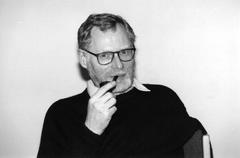Dieter Trines (1993). Photo: DESY, Nowakowski
DESY mourns the death of its former accelerator director Dr. Dieter Trines. Dieter Trines was the head of the accelerator division at DESY from 1995 to 2007. He advanced the development of particle accelerators with great commitment in international collaborations worldwide. On July 27 he passed away at the age of 81.
Dieter Trines graduated with a PhD from the University of Bonn in 1972. From 1971 to 1982, he worked for RWTH Aachen University as a scientific assistant and academic councilor. During this time he participated in an experiment on deep inelastic e-p scattering at the Stanford Linear Accelerator Center SLAC in the group of Richard Taylor and subsequently in the construction and commissioning of the storage ring PETRA and the experiment TASSO at DESY. Already during this time he developed a great interest in accelerators and frequently visited the accelerator control room. This made him the perfect link between the TASSO experiment and the PETRA accelerator.
In 1983, Dieter Trines was hired at DESY in the F1 group. Together with Björn Wiik, he participated in the design and development work for HERA and took over the leadership of a project group for the creation of the vacuum systems of the HERA proton ring. In this capacity, he contributed significantly to the successful construction and commissioning of HERA. In 1992, he became group leader for cryogenics and vacuum within the M division.
In 1995, Dieter Trines was finally appointed Division Director for the Accelerator Division and Member of the Directorate at DESY. His tenure, which lasted until his retirement in mid-2007, saw major developments in DESY's accelerator facilities and technologies. These include the improvement of HERA's performance, the preparation of the PETRA III project, the extension of the TESLA test facility to the FEL user facility FLASH, and the elaboration of the design for the TESLA linear collider and the FEL facility, which was initially connected to it and later realized separately. The establishment of the superconducting TESLA technology and the view towards series production are among the outstanding achievements of this period, which in later years enabled the very successful implementation of the European XFEL project. Worldwide, this superconducting technology, developed at DESY and decisively influenced by Dieter Trines, is successfully used today in many accelerators.
Even after his retirement, he contributed significantly to the recent start-up of the ALPS II experiment with his great commitment to the technical coordination of the set-up work for the experiment and his profound knowledge of the superconducting HERA magnets, some of which had to be modified for the ALPS II.
Dieter Trines was held in high esteem by his colleagues and collaborators because of his friendly and cooperative demeanor. Like no other, he embodied the "DESY spirit", which is one of the decisive factors for the success of the research center.
With Dieter Trines, the research center DESY loses one of its most formative figures. His technical expertise and far-sightedness have contributed significantly to DESY's current reputation as a leading international accelerator laboratory. We are deeply indebted to him and will always honor his memory.
Our deepest sympathy goes to his relatives.








